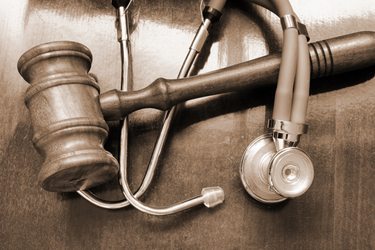Dallas Abortion Providers Settle Out of Court, Retain Admitting Privileges
A Dallas hospital tried to revoke two doctors' admitting privileges because they provide legal abortion care, but the two parties have now settled out of court.

Two Dallas doctors who sued a local hospital for attempting to rescind their admitting privileges because they provide legal abortion care settled out of court on Monday, just one day before they were set to go to trial. The doctors had continued to provide legal abortion care under a temporary restraining order that kept their privileges in place. Now, a permanent injunction will allow the doctors to maintain their privileges at University General Hospital Dallas (UGHD).
According to court documents, doctors Lamar Robinson and Jasbir Ahluwalia’s “admitting privileges remain current and in good standing at UGHD.”
The doctors, who provide legal abortion care at two different Dallas facilities, filed suit against UGHD in April after receiving letters informing them that their “practice of performing [legal abortion] procedures is disruptive to the business and reputation of UGHD,” and thus the hospital intended to revoke their admitting privileges.
State and federal law bars hospitals from discriminating against doctors who provide legal abortion care.
Part of Texas’ new omnibus anti-abortion law, HB 2, requires that doctors who provide abortion care acquire hospital admitting privileges within 30 miles of where they perform their procedures. That part of the law has ended legal abortion care at about one-third of Texas clinics, making every abortion provider who is able to keep their doors open that much more vital to the continuing provision of legal abortion care in the state.
“Dr. Robinson has his own clinic, Abortion Advantage, where he was the sole provider. This means that that clinic can stay open,” explained Esha Bhandari, a staff attorney with the Center for Reproductive Rights, which represents the abortion providers in a separate suit challenging a provision of HB 2 that requires their abortion facilities to operate as hospital-like ambulatory surgical centers. Bhandari said that Dr. Ahluwalia was one of just two providers at his facility.
“They both are obviously a big part of the providers in Dallas,” she said.
Robinson and Ahluwalia alleged in court documents that UGHD had been pressured by anti-choice activists, who threatened to publicly protest at the hospital if it did not revoke the doctors’ privileges on demand.
Calls to University General Hospital Dallas’ parent hospital in Houston were not immediately returned, but the UGH system president told the Dallas Morning News that his hospital never discriminated against Robinson and Ahluwalia, despite telling the doctors that their practice of providing legal abortion care “creates significant exposure and damages to UGHD’s reputation within the community.”
Bhandari said she hopes this case “sends a message to other hospitals: if people are facing protests or want to cave to pressure, this settlement is proof that there is a statute that exists to protect these doctors and it is enforceable.”
But even though Robinson and Ahluwalia can continue providing legal abortion care without fear of losing their privileges for now, they will ultimately be forced to stop providing abortion care at their Dallas facilities in September when the last plank of HB 2, which requires abortion clinics to operate as hospital-style ambulatory surgical centers (ASCs), goes into place.
At that time, HB 2 is expected to shutter all but the six existing legal abortion facilities in the state that have been able either to make million-dollar upgrades to, or move into, ASC-like arrangements.
While proponents of HB 2 said that it would increase the health and safety of pregnant Texans who seek abortions, the law was opposed as unnecessary by many mainstream medical associations. Bhandari said this case in particular highlights the “absurdity” of the admitting privileges requirement. Neither doctor ever had cause to admit a patient with abortion-related complications to UGHD despite having privileges at UGHD for months after the admitting privileges provision of HB 2 went into effect.
“This whole issue does highlight the absurdity of the admitting privileges requirement, and how safe abortion is, that the doctors never even had to use the facilities at UGHD,” she said.

